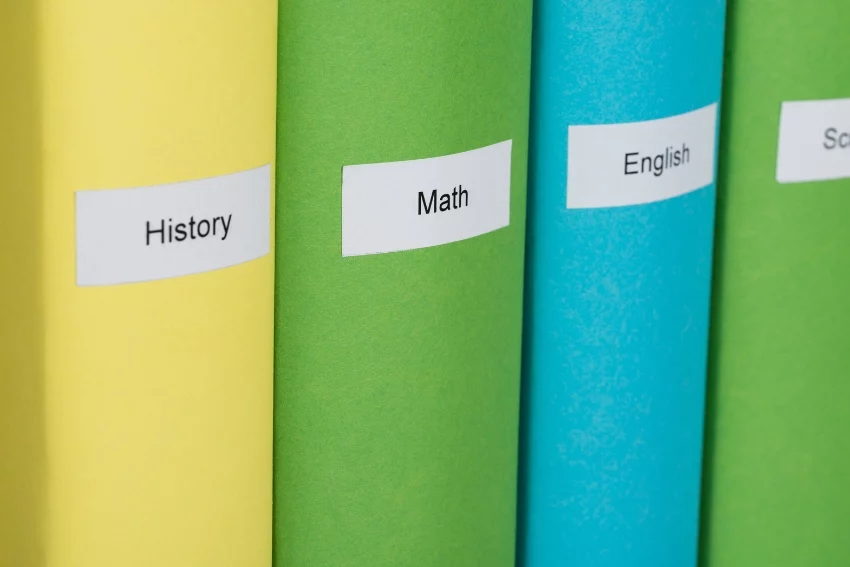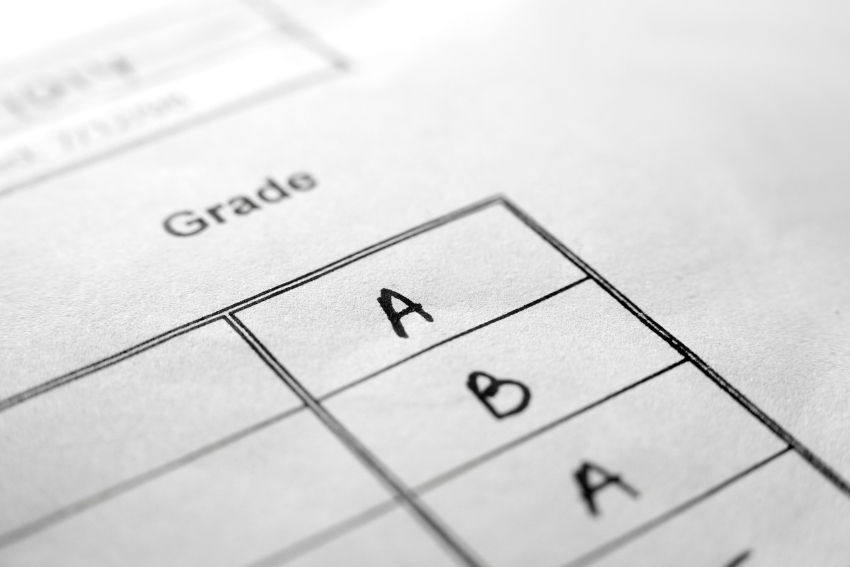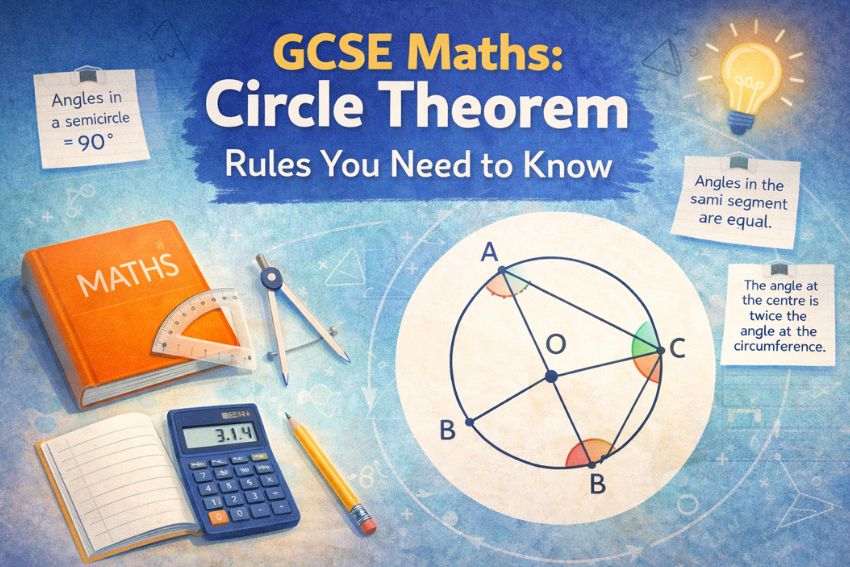What are Your GCSE Subject Options?
With over 60 GCSE subjects available, choosing from all GCSE options can be overwhelming. What will be the best pick for you? Can you get into your desired university with these subjects? Is there a subject you don’t even know about? Let’s discuss, what different types of subjects there are and how many should you choose.
How Many GCSE Subjects are There?
There are 5 mandatory GCSE Subjects – English, maths, biology, chemistry and physics.
The number of subjects offered for GCSEs can range widely, with around 60 subjects available for students to choose from. In practice, there’s no single answer to how many GCSEs do you need. However, most schools typically offer around 20 subjects.
Speak with your teachers to learn what subjects are offered at your school.
How Many GCSE Exams Will a Student Have?
GCSE subjects usually consist of either 2 or 3 papers. This means that for a single subject, students might have to take up to 3 separate exams. Typically, students are required to complete around 18 to 25 exams in total.
What are The Mandatory Subjects in GCSEs?
In the UK, every student must study three core GCSE subjects: English, Mathematics, and Science. These compulsory subjects ensure that all students acquire essential skills necessary for their future educational and career opportunities
These GCSE subjects, known as the core subjects, include:
- Maths
- English language
- Science (Biology, Chemistry, Physics).
Maths and English are considered the foundation for most academic and career paths, as they provide students with the essential skills of numeracy and literacy. In fact, until you turn 19, you are legally required to resit GCSE English and maths to receive a passing grade.
Some schools require students to take one modern language GCSE, and physical education as a subject, but without requiring them to sit the exam.
How Many GCSEs Do You Need?
The number of GCSE subjects you can select depends on your school, but most students are able to choose between 5 and 9 optional subjects on top of the compulsory ones. Asking yourself how many GCSE options can you pick or how many subjects do you pick for GCSE will help you plan a balanced workload. There’s no one-size-fits-all answer for how many GCSE subjects to take. Aside from the 5 mandatory, the choice is yours. Most students go for about 9 subjects in total.
When choosing, consider your interests and career goals. For example, if you’re interested in pursuing Computer Science, consider adding GCSE subjects like Computer Science, Information and Communication Technology (ICT) and Further Maths to your selection, which is often considered one of the most challenging subjects in the curriculum due to its advanced content and complex problem-solving requirements. The key is to pick subjects that suit your future plans and keep you engaged.
What are Optional GCSE Subjects?

In addition to the mandatory subjects, students have the option to choose from a wide range of subjects to complete their GCSE education. The choice of optional subjects is a great opportunity for students to explore their interests and passions, and to tailor their GCSE options to their individual needs and career goals. This is where you answer what to pick for GCSE or what to choose for GCSE. Popular options include:
Modern Foreign Languages
GCSE Modern Foreign Languages (MFLs) provide students with the opportunity to develop their linguistic skills and gain a deeper understanding of different cultures. GCSE MFLs courses cover a range of topics including:
- Everyday conversations
- Culture and society
- Grammar and vocabulary
The assessment consists of four papers:
- Listening (30%)
- Reading (30%)
- Writing (20%)
- Speaking (20%)
GCSE MFLs Include:
Career Opportunities After Taking GCSE Modern Foreign Languages
Students who study GCSE Modern Foreign Languages can pursue a wide range of careers, including:
- International business
- Diplomacy
- Tourism
- Translation and interpretation
- Teaching
- Research
GCSE Modern Foreign Languages are ideal for students interested in:
- Learning a new language
- Traveling to different countries
- Experiencing different cultures
- Working in international fields
Humanity Subjects
GCSE History
History is the study of the past, and it provides students with an understanding of how the world has come to be the way it is today. The GCSE History course covers a range of topics, including:
- British history
- European history
- World history
The GCSE History assessment consists of four papers:
- Paper 1: British history (30%)
- Paper 2: European history (30%)
- Paper 3: World history (30%)
- Coursework (20%)
GCSE English Literature
English Literature is the study of written works, and it provides students with an appreciation of literature from different periods and cultures. The GCSE English Literature course covers a range of topics, including:
- Shakespeare
- Poetry
- Prose
- Literary criticism
The GCSE English Literature assessment consists of three papers:
- Paper 1: Shakespeare and poetry (40%)
- Paper 2: Prose (40%)
- Coursework (20%)
GCSE Geography
Geography is the study of the Earth’s surface and its inhabitants, and it provides students with an understanding of the world’s physical and human landscapes. The GCSE Geography course covers a range of topics, including:
- Physical geography
- Human geography
- Environmental geography
The GCSE Geography assessment consists of four papers:
- Paper 1: Physical geography (30%)
- Paper 2: Human geography (30%)
- Paper 3: Environmental geography (30%)
- Fieldwork (20%)
GCSE Religious Studies
Religious Studies is the study of religion and belief, and it provides students with an understanding of the world’s major religions. The GCSE Religious Studies course covers a range of topics, including:
- Christianity
- Islam
- Hinduism
- Sikhism
The GCSE Religious Studies assessment consists of two papers:
- Paper 1: Christianity (50%)
- Paper 2: Islam, Hinduism, and Sikhism (50%)
GCSE Economics
Economics is the study of how people make choices about the use of scarce resources, and it provides students with an understanding of the economic system and accountancy. The GCSE Economics course covers a range of topics, including:
- Microeconomics
- Macroeconomics
- International economics
The GCSE Economics assessment consists of three papers:
- Paper 1: Microeconomics (33.3%)
- Paper 2: Macroeconomics (33.3%)
- Paper 3: International economics (33.3%)
GCSE Geology
Geology is the study of the Earth’s structure and the processes that have shaped it, and it provides students with an understanding of the Earth’s history. The GCSE Geology course covers a range of topics, including:
- Rocks and minerals
- Plate tectonics
- Geological hazards
The GCSE Geology assessment consists of two papers:
- Paper 1: Foundations of geology (50%)
- Paper 2: The changing Earth (50%)
GCSE Psychology
Psychology is the study of the human mind and behaviour, and it provides students with an understanding of how people think, feel, and act. The GCSE Psychology course covers a range of topics, including:
- Cognitive psychology
- Social psychology
- Developmental psychology
The GCSE Psychology assessment consists of two papers:
- Paper 1: Introductory psychology (50%)
- Paper 2: Psychology in action (50%)
GCSE Sociology
Sociology is the study of society and human behaviour, and it provides students with an understanding of the social forces that shape our lives. The GCSE Sociology course covers a range of topics, including:
- Social class
- Gender
- Race and ethnicity
- Crime and deviance
The GCSE Sociology assessment consists of two papers:
- Paper 1: Introduction to sociology (50%)
- Paper 2: Sociology in action (50%)
Career Opportunities
Students who study GCSE Humanities subjects can pursue a wide range of careers, including:
- Teaching
- Social work
- Journalism
- Law
- Business
- Government
- Non-profit organisations
Arts Subjects
GCSE Music
Music is the study of sound, and it provides students with an understanding of the elements of music, music theory, and music history. The GCSE Music course covers a range of topics, including:
- Music theory
- Music history
- Performance
- Composition
The GCSE Music assessment consists of three papers:
- Paper 1: Listening (30%)
- Paper 2: Performing (40%)
- Paper 3: Composing and music appreciation (30%)
GCSE Drama
Drama is the study of performance, and it provides students with an understanding of acting, directing, and playwriting. The GCSE Drama course covers a range of topics, including:
- Acting
- Directing
- Playwriting
- Theatre history
The GCSE Drama assessment consists of three papers:
- Paper 1: Devising and performing (40%)
- Paper 2: Performance to text (30%)
- Paper 3: Theatre in practice (30%)
GCSE Dance
Dance is the study of movement, and it provides students with an understanding of the elements of dance, dance history, and choreography. The GCSE Dance course covers a range of topics, including:
- Dance technique
- Dance history
- Choreography
- Performance
The GCSE Dance assessment consists of two papers:
- Paper 1: Practical dance (50%)
- Paper 2: Dance appreciation (50%)
GCSE Art and Design
Art and Design is the study of visual art, and it provides students with an understanding of the elements of art, art history, and art techniques. The GCSE Art and Design course covers a range of topics, including:
- Drawing
- Painting
- Printmaking
- Sculpture
The GCSE Art and Design assessment consists of three components:
- Coursework (60%)
- Practical exam (20%)
- Personal study (20%)
GCSE Media Studies
Media Studies is the study of media, and it provides students with an understanding of how media are produced, consumed, and interpreted. The GCSE Media Studies course covers a range of topics, including:
- Film
- Television
- Radio
- Advertising
The GCSE Media Studies assessment consists of two papers:
- Paper 1: Film studies (50%)
- Paper 2: Media studies (50%)
GCSE Film Studies
Film Studies is the study of film, and it provides students with an understanding of how films are made, how they tell stories, and how they are interpreted. The GCSE Film Studies course covers a range of topics, including:
- Film history
- Film genres
- Film analysis
The GCSE Film Studies assessment consists of two papers:
- Paper 1: Film study (50%)
- Paper 2: Filmmaking (50%)
Career Opportunities
Students who study GCSE Arts subjects can pursue a wide range of careers, including:
- Music teacher
- Drama teacher
- Dance teacher
- Art and Design teacher
- Media Studies teacher
- Film Studies teacher
- Musician
- Actor
- Dancer
- Artist
- Photographer
- Filmmaker
- Journalist
- TV producer
- Radio producer
Technical Subjects
Design and Technology is the study of how to design and make products, and it provides students with an understanding of the principles of design, engineering, and technology. The GCSE Design and Technology course covers a range of topics, including:
- Product design
- Engineering design
- Manufacturing processes
The GCSE Design and Technology assessment consists of two components:
- Coursework (60%)
- Practical exam (40%)
GCSE Food Technology
Food Technology is the study of food and nutrition, and it provides students with an understanding of the science of food, food preparation, and food safety. The GCSE Food Technology course covers a range of topics, including:
- Food science
- Nutrition
- Food preparation
- Food safety
The GCSE Food Technology assessment consists of two components:
- Coursework (60%)
- Practical exam (40%)
GCSE Computer Science
Computer Science is the study of computers and how they work, and it provides students with an understanding of the principles of programming, computer systems, and algorithms. The GCSE Computer Science course covers a range of topics, including:
- Programming
- Computer systems
- Algorithms
- C++ computer language
The GCSE Computer Science assessment consists of two papers:
- Paper 1: Computer systems (40%)
- Paper 2: Programming (60%)
GCSE Physical Education
Physical Education is the study of physical activity and healthy living, and it provides students with an understanding of the importance of exercise, nutrition, and fitness. The GCSE Physical Education course covers a range of topics, including:
- Exercise physiology
- Nutrition
- Fitness
The GCSE Physical Education assessment consists of two components:
- Coursework (60%)
- Practical exam (40%)
GCSE Astronomy
Astronomy is the study of the universe and its contents, and it provides students with an understanding of the stars, planets, galaxies, and other celestial objects. The GCSE Astronomy course covers a range of topics, including:
- The solar system
- Stars and galaxies
- Cosmology
The GCSE Astronomy assessment consists of two papers:
- Paper 1: Foundations of astronomy (50%)
- Paper 2: The changing universe (50%)
GCSE Business
Business is the study of how businesses operate, and it provides students with an understanding of the principles of marketing, finance, and management. The GCSE Business course covers a range of topics, including:
- Marketing
- Finance
- Management
The GCSE Business assessment consists of three papers:
- Paper 1: Business fundamentals (33.3%)
- Paper 2: Business operations (33.3%)
- Paper 3: Business decision-making (33.3%)
GCSE Electronics
Electronics is the study of electronic circuits and devices, and it provides students with an understanding of the principles of electricity, electronics, and microelectronics. The GCSE Electronics course covers a range of topics, including:
- Electricity
- Electronics
- Microelectronics
The GCSE Electronics assessment consists of two papers:
- Paper 1: Electronic principles (50%)
- Paper 2: Electronic systems (50%)
GCSE Engineering
Engineering is the study of how to design and build machines and structures, and it provides students with an understanding of the principles of engineering mechanics, materials science, and engineering design. The GCSE Engineering course covers a range of topics, including:
- Engineering mechanics
- Materials science
- Engineering design
The GCSE Engineering assessment consists of two components:
- Coursework (60%)
- Practical exam (40%)
GCSE Statistics
Statistics is the study of data collection, analysis, and interpretation, and it provides students with an understanding of how to use data to make informed decisions. The GCSE Statistics course covers a range of topics, including:
- Data collection
- Data analysis
- Data interpretation
The GCSE Statistics assessment consists of two papers:
- Paper 1: Statistical methods (50%)
- Paper 2: Statistical applications (50%)
Career Opportunities
Students who study GCSE Technical subjects can pursue a wide range of careers, including:
- Engineering
- Computer science
- IT
- Technology
- Science
- Health
- Business
- Finance
- Education
- Government
What are the most common GCSE subjects?
The most common GCSE subjects that students typically take in the UK include a mix of compulsory core subjects and popular elective options. Here are the school subjects that are most frequently studied at the GCSE level:
- English Language: Compulsory for all students, focusing on reading, writing, comprehension, and critical analysis skills.
- English Literature: Often compulsory, involving the study of novels, poetry, and drama from various periods and cultures.
- Mathematics: A compulsory subject that covers topics such as algebra, geometry, statistics, and arithmetic.
- Sciences:
- Combined Science (Double Award), which is common in many schools and covers basic principles in Biology, Chemistry, and Physics.
- Triple Science, where Biology, Chemistry, and Physics are taken as separate GCSEs, often chosen by students aiming for further studies in scientific fields.
- History: A popular choice for humanities, covering a range of historical periods and events, with a focus on understanding historical concepts and developing analytical skills.
- Geography: Another common humanities subject that explores physical and human geography, environmental issues, and global development.
- Modern Foreign Languages: Languages like French, Spanish, and German are commonly offered and selected, with some schools also providing options like Mandarin, Italian, or Russian.
- Physical Education: Often available as an elective, focusing on physical fitness, sports science, and wellness.
These subjects are typically complemented by various other electives depending on the school’s curriculum and the students’ interests, such as Art and Design, Music, Computer Science, and Business Studies. Schools encourage a balanced selection that covers core academic skills and personal interests, helping students to meet educational requirements and prepare for future career paths.
How to Choose Your GCSE Options?
When it comes to choosing your GCSE options, there’s no right or wrong answer. On average, students choose 9 GCSE subjects, but you can choose more or fewer depending on your interests and abilities. However, it’s important to keep in mind that it’s recommended not to choose more than 16 GCSE subjects.
The key is to choose your GCSE options wisely. It’s better to have good grades in respected subjects, even if it means only taking a few subjects than to have easy 9s in many subjects that may not hold as much weight in the future. Take time to think about your strengths, interests, and future goals, and consider how each school subject you choose will support you in achieving those goals. Remember that your GCSE options will form the foundation for your further education and career, so choose carefully.
To help you decide, you can read this guide to choosing GCSE subjects.
What are the easiest GCSE options?
When choosing GCSE options, many students consider school subjects they find manageable or enjoyable. While every subject requires effort, some easier GCSE subjects are often seen as less academically demanding and more practical or creative, making them popular choices. Here are a few GCSE options commonly viewed as more accessible, particularly for students with strengths in creativity, practical skills, or physical activity
- Media Studies – Known for its creative aspects and practical projects, with less focus on heavy theory.
- Drama – Involves practical assessments and performance, which can be easier for those who enjoy acting and have good communication skills.
- Physical Education (PE) – Suits active students and includes a practical component alongside some theoretical work.
- Religious Studies (RS) – Often involves straightforward content and tends to focus on essay writing and discussion-based questions.
- Food Technology – Combines practical cooking skills with basic theoretical knowledge about nutrition and food preparation.
- Art and Design – Ideal for creative students, although it involves a significant amount of coursework.
While these school subjects may seem easier to some, it’s essential to choose GCSEs that match individual skills and interests, as this often leads to better engagement and performance.
New GCSE Grading System
The implementation of the new 9-1 grading system has introduced an additional level of complexity, leaving many students and parents feeling uncertain about what grades to expect and what they mean. Starting in 2017, the GCSE grading system in England underwent a transition from the conventional A*-G scale to a numeric 9-1 format.
This modification was introduced to align English educational standards with those of other top-performing nations and to mirror the updated, more rigorous course content and linear evaluation approach. For more detailet overview of the new GCSE grading system check our blog GCSE Grades and Grade Boundaries Explained
Conclusion
In conclusion, GCSE education provides students with a broad and balanced education, and the opportunity to pursue their interests and career goals. With over 70 subjects available, choosing the right combination of subjects can be overwhelming. However, by understanding the mandatory subjects, the optional subjects available and the different types of GCSE subjects, students can make informed decisions that will set the foundation for their future education and career success.
Each GCSE subject category offers a unique range of school subjects, each with its own set of knowledge and skills. It’s the best option if you can choose at least one subject from each. Hence, this can give you broader career choices.
At the end of the day, it’s up to you how many subjects you choose. Make sure you have enough time for all the subjects and you don’t overwork yourself. You should not forget to enjoy your teenage years!
If you’re unsure what to pick for GCSE or need guidance on particular subjects, Edumentors’ online tutoring can help. All Edumentors tutors have recently passed their GCSEs with flying colours and now study at top UK universities such as Oxford, Cambridge and etc. Therefore, they have exam techniques, tips and tricks to help you ace your GCSEs too!
FAQs
What are the GCSE options?
Typically, students are required to study approximately nine subjects at GCSE level. The fundamental school subjects that everyone must undertake in England and Wales include Maths, English, and Science. English Language is a mandatory subject in all schools, and English Literature is compulsory in most schools in England, though there are some exceptions, so it’s important to verify. In Wales, studying Welsh is obligatory.
Science subjects might be offered as three distinct subjects (Biology, Chemistry, and Physics) or combined into two Science GCSEs.
It’s also worth noting that certain schools might mandate additional subjects, so it’s advisable to consult your teachers to understand the specific requirements of your school.
How many options do you get at GCSE?
Every student will undertake GCSE courses in English Language, English Literature, Maths, Combined Science, Core Physical Education. In addition, students have the option to select four subjects for their GCSE options, along with one additional subject as a backup.
What subjects are needed in GCSE?
In England and Wales, Maths, English and Science constitute the fundamental subjects that all students are required to study at the GCSE level. It is mandatory for all schools to teach English Language, and most school subjects also include English Literature in their curriculum, though there are some exceptions. Therefore, it’s recommended to confirm this information with the college.
Is 7 GCSE subjects enough?
Admission criteria for school and college sixth forms differ, spanning from four to five GCSE subjects at grades 5-4, including grades 6-5 in the subjects you wish to pursue, to a minimum of six GCSE subjects at grade 7 or higher for the more selective colleges.
Is 7 GCSEs enough for Oxford?
Typically, a successful applicant to Oxford University is expected to have at least 8 or 9 GCSEs. Yet, securing GCSEs is merely the initial step, as you must also achieve the A-Level grades that are required by Oxford University for the specific course you wish to enrol in.
What are the 2 types of GCSE?
The two tiers are akin to the foundation and higher tiers in the GCSE system, with Level 1 qualifications including GCSE grades G through D or 1 to 3, and Level 2 qualifications comprising grades C to A* or 4 to 9. GCSEs are assigned grades that span two levels of the Regulated Qualifications Framework (RQF): Level 1 and Level 2.
How Many GCSEs Can You Take?
Students in the UK typically take 8 to 10 GCSEs, but the number can vary depending on individual choices and school options. While the core subjects—English, Maths, and Science—are mandatory, students can choose additional GCSEs from a range of subjects such as History, Geography, Art, and Modern Languages. Some students may opt for more GCSEs if they have specific academic goals, while others might focus on fewer subjects to maximise their performance.
What are the 5 subjects for GCSE?
The five core subjects typically required for GCSE are:
- English Language
- English Literature
- Mathematics
- Science (often taken as Combined Science or separate sciences like Biology, Chemistry, and Physics)
- A Humanities Subject (often History or Geography)
These are generally mandatory in most schools, but students also have the option to choose additional subjects based on their interests and career goals.
How many GCSEs do you take in Year 11?
Most students take between 8 to 10 GCSEs in Year 11. This can vary depending on the school and the student’s academic goals. Core subjects, including English, Maths, and Science, are required, and students usually select several optional subjects like History, Geography, Modern Foreign Languages, or Art. The exact
How many GCSE options do you pick in Year 9?
In Year 9, students typically choose three to four optional GCSE subjects in addition to the core subjects (such as English, Maths, and Science) which are mandatory. The exact number can vary based on the school’s curriculum structure and any specific requirements they may have.
Common optional subjects include History, Geography, Modern Foreign Languages, Art, Design Technology, and Computer Science. These choices are made to tailor the GCSE programme to each student’s interests and potential career paths.
What are the 12 GCSEs?
There isn’t a set list of 12 GCSEs as students typically choose a mix of core and optional subjects, but a common selection might include:
- English Language
- English Literature
- Mathematics
- Biology
- Chemistry
- Physics
- History or Geography
- A Modern Foreign Language (e.g., French, Spanish, or German)
- Religious Studies
- Computer Science
- Art and Design
- Physical Education or Music
This combination covers a broad range of academic areas, providing a balanced curriculum. Some students may take fewer or more, depending on their interests and the options available at their school.
What are the 5 hardest GCSEs?
The difficulty of GCSE subjects can vary widely depending on individual strengths and preferences, but here are five GCSEs commonly considered to be among the most challenging:
- Further Maths: This course builds on the regular Maths GCSE with more complex topics, including algebra, geometry, and calculus, making it tough for those who do not have a strong foundation in maths.
- Physics: GCSE Physics is challenging due to its abstract concepts, mathematical content, and the need to apply principles to different scenarios. It often requires a good understanding of both theory and practical applications.
- Chemistry: Like Physics, GCSE Chemistry involves a mix of complex concepts and practical application. It requires a strong understanding of scientific processes and the ability to remember various chemical reactions and equations.
- Biology: Although it is considered the least mathematical of the sciences, Biology involves a vast amount of content to memorise, including complex processes and detailed knowledge of anatomy and ecosystems.
- Modern Foreign Languages: Learning a new language from scratch to a level of proficiency within a couple of years is challenging. This includes mastering grammar, vocabulary, spoken language, and understanding cultural contexts.
These subjects are generally considered tough due to the depth of understanding required, the breadth of content covered, and the skills needed to apply knowledge effectively in exams.









